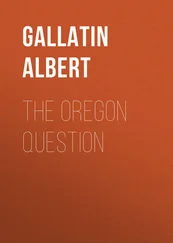Henry Adams - The Life of Albert Gallatin
Здесь есть возможность читать онлайн «Henry Adams - The Life of Albert Gallatin» — ознакомительный отрывок электронной книги совершенно бесплатно, а после прочтения отрывка купить полную версию. В некоторых случаях можно слушать аудио, скачать через торрент в формате fb2 и присутствует краткое содержание. Жанр: foreign_antique, foreign_prose, на английском языке. Описание произведения, (предисловие) а так же отзывы посетителей доступны на портале библиотеки ЛибКат.
- Название:The Life of Albert Gallatin
- Автор:
- Жанр:
- Год:неизвестен
- ISBN:нет данных
- Рейтинг книги:4 / 5. Голосов: 1
-
Избранное:Добавить в избранное
- Отзывы:
-
Ваша оценка:
- 80
- 1
- 2
- 3
- 4
- 5
The Life of Albert Gallatin: краткое содержание, описание и аннотация
Предлагаем к чтению аннотацию, описание, краткое содержание или предисловие (зависит от того, что написал сам автор книги «The Life of Albert Gallatin»). Если вы не нашли необходимую информацию о книге — напишите в комментариях, мы постараемся отыскать её.
The Life of Albert Gallatin — читать онлайн ознакомительный отрывок
Ниже представлен текст книги, разбитый по страницам. Система сохранения места последней прочитанной страницы, позволяет с удобством читать онлайн бесплатно книгу «The Life of Albert Gallatin», без необходимости каждый раз заново искать на чём Вы остановились. Поставьте закладку, и сможете в любой момент перейти на страницу, на которой закончили чтение.
Интервал:
Закладка:
“The power claimed by the House is not that of negotiating and proposing treaties; it is not an active and operative power of making and repealing treaties; it is not a power which absorbs and destroys the constitutional right of the President and Senate to make treaties; it is only a negative, a restraining power on those subjects over which Congress has the right to legislate. On the contrary, the power claimed for the President and Senate is that, under color of making treaties, of proposing and originating laws; it is an active and operative power of making laws and of repealing laws; it is a power which supersedes and annihilates the constitutional powers vested in Congress.
“If it is asked, in what situation a treaty is which has been made by the President and Senate, but which contains stipulations on legislative objects, until Congress has carried them into effect? whether it is the law of the land and binding upon the two nations? I might answer that such a treaty is precisely in the same situation with a similar one concluded by Great Britain before Parliament has carried it into effect.
“But if a direct answer is insisted on, I would say that it is in some respects an inchoate act. It is the law of the land and binding upon the American nation in all its parts, except so far as relates to those stipulations. Its final fate, in case of refusal on the part of Congress to carry those stipulations into effect, would depend on the will of the other nation.”
The Federalists had in this debate failed to hold well together; the ground assumed by Mr. Griswold was too extreme for some even among the leaders, and concessions were made on that side which fatally shook their position; but among the Republicans there was concurrence almost, if not quite, universal in the statements of the argument by Mr. Madison and Mr. Gallatin, and this closing authoritative position of Mr. Gallatin was on the same day adopted by the House on a vote of 62 to 37, only five members not voting.
The Administration might perhaps have contented itself with refusing the papers called for by the House, and left the matter as it stood, seeing that the resolution calling for the papers said not a word about the treaty-making power, and the journals of the House contained no allusion to the subject; or the President might have contented himself with simply asserting his own powers and the rights of his own Department; but, as has been already seen, there was at this time an absence of fixed precedent which occasionally led executive officers to take liberties with the Legislature such as would never afterwards have been tolerated. The President sent a message to the House which was far from calculated to soothe angry feeling. Two passages were especially invidious. In one the President adverted to the debates held in the House. In the other he assumed a position in curious contrast to his generally cautious tone: “Having been a member of the general convention, and knowing the principles on which the Constitution was formed, I have, &c., &c.” For the President of the United States on such an occasion to appeal to his personal knowledge of the intentions of a body of men who gave him no authority for that purpose, and whose intentions were not a matter of paramount importance, seeing that by universal consent it was not their intentions which interpreted the Constitution, but the intentions of the people who adopted it; and for him to use this language to a body of which Mr. Madison was leader, and which had adopted Mr. Madison’s views, was a step not likely to diminish the perils of the situation. Had the President been any other than Washington, or perhaps had the House been led by another than Madison, the opportunity for a ferocious retort would probably have been irresistible. As it was, the House acted with great forbearance; it left unnoticed this very vulnerable part of the message, and in reply to the implication that the House claimed to make its assent “necessary to the validity of a treaty,” it contented itself with passing a resolution defining its own precise claim. On this resolution Mr. Madison spoke at some length and with perfect temper in reply to what could only be considered as the personal challenge contained in the message, while Mr. Gallatin did not speak at all. The resolutions were adopted by 57 to 35, and the House then turned to the merits of the treaty.
On this subject Mr. Gallatin spoke at considerable length on the 26th April, a few days before the close of the debate. The situation was extremely difficult. In the country at large opinion was as closely divided as it was in the House itself. Even at the present moment it is not easy to decide in favor of either party. Nothing but the personal authority of General Washington carried the hesitating assent of great masses of Federalists. Nothing but fear of war made approval even remotely possible. Whether the danger of war was really so great as the friends of the treaty averred may be doubted. No Federalist Administration would have made war on England, for it was a cardinal principle with the Hamiltonian wing of the party that only through peace with England could their ascendency be preserved, while war with England avowedly meant a dissolution of the Union by their own act. 32The Republicans wanted no war with England, as they afterwards proved by enduring insults that would in our day rouse to madness every intelligent human being within the national borders. Nevertheless war appeared or was represented as inevitable in 1796; the eloquent speech of Fisher Ames contained no other argument of any weight; it was abject fear to which he appealed: “You are a father: the blood of your sons shall fatten your corn-field. You are a mother: the war-whoop shall wake the sleep of the cradle.”
It was the truth of this reproach on the weakness of the argument for the treaty that made the sting of Mr. Gallatin’s closing remarks:
“I cannot help considering the cry of war, the threats of a dissolution of government, and the present alarm, as designed for the same purpose, that of making an impression on the fears of this House. It was through the fear of being involved in a war that the negotiation with Great Britain originated; under the impression of fear the treaty has been negotiated and signed; a fear of the same danger, that of war, promoted its ratification: and now every imaginary mischief which can alarm our fears is conjured up, in order to deprive us of that discretion which this House thinks it has a right to exercise, and in order to force us to carry the treaty into effect.”
Nevertheless Mr. Gallatin carefully abstained from advocating a refusal to carry the treaty into effect. With his usual caution he held his party back from any violent step; he even went so far as to avow his wish that the treaty might not now be defeated:
“The further detention of our posts, the national stain that would result from receiving no reparation for the spoliations on our trade, and the uncertainty of a final adjustment of our differences with Great Britain, are the three evils which strike me as resulting from a rejection of the treaty; and when to these considerations I add that of the present situation of the country, of the agitation of the public mind, and of the advantages that would arise from a union of sentiments; however injurious and unequal I conceive the treaty to be, however repugnant it may be to my feelings and, perhaps, to my prejudices, I feel induced to vote for it, and will not give my assent to any proposition which would imply its rejection.”
He also carefully avoided taking the ground which was undoubtedly first in his anxieties, that of the bearing which the treaty would have on our relations with France. This was a subject which his semi-Gallican origin debarred him from dwelling upon. The position he took was a new one, and for his party perfectly safe and proper; it was that, in view of the conduct of Great Britain since the treaty was signed, her impressment of our seamen, her uninterrupted spoliations on our trade, especially in the seizure of provision vessels, “a proceeding which they might perhaps justify by one of the articles of the treaty,” a postponement of action was advisable until assurances were received from Great Britain that she meant in future to conduct herself as a friend.
Читать дальшеИнтервал:
Закладка:
Похожие книги на «The Life of Albert Gallatin»
Представляем Вашему вниманию похожие книги на «The Life of Albert Gallatin» списком для выбора. Мы отобрали схожую по названию и смыслу литературу в надежде предоставить читателям больше вариантов отыскать новые, интересные, ещё непрочитанные произведения.
Обсуждение, отзывы о книге «The Life of Albert Gallatin» и просто собственные мнения читателей. Оставьте ваши комментарии, напишите, что Вы думаете о произведении, его смысле или главных героях. Укажите что конкретно понравилось, а что нет, и почему Вы так считаете.












